Supplying green electric power generated by biomass power generation contributes to RENOVA’s efforts in achieving its goal of carbon neutrality by 2050.
We generate electricity using wood biomass fuels such as wood chips, wood pellets, and PKS (palm kernel shells) to supply green electric power.
As of April 2024, RENOVA has seven large biomass power plants in operation or under construction in Japan, and when they are all operational, the total amount of electricity generated will amount to approximately 3,000 GWh per year, which is enough to power approximately 1 million ordinary households.
Akita Biomass Power Plant procures approximately 70% of its fuel from within Akita Prefecture, contributing to the revitalization of the local forestry industry and improving energy self-sufficiency rates.
Kanda Biomass Power Plant also procures wood chips from northern Kyushu and is working to further improve its ratio of procurement from within the prefecture and neighboring regions.
Examples of Sustainability Initiatives in Biomass Power Generation
RENOVA places an emphasis on minimizing the impact of the design and construction of biomass power plants on water, air, surrounding environments and local flora and fauna.
We aim for business operations that lead to harmonious coexistence and prosperity with local communities. Through dialogues, we offer care and consideration and implement initiatives that can give greater peace of mind to local people.
Initiatives to Achieve Carbon Neutrality
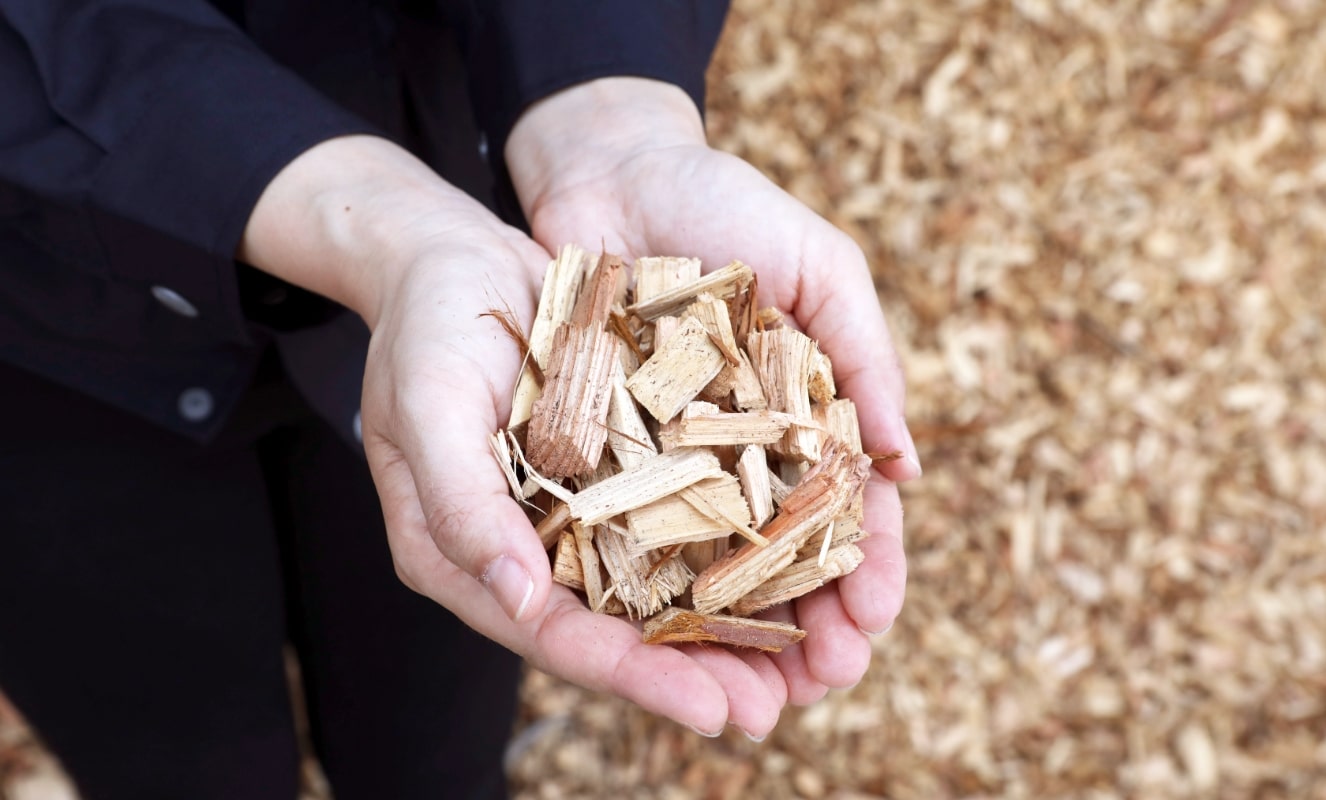
Wood chips
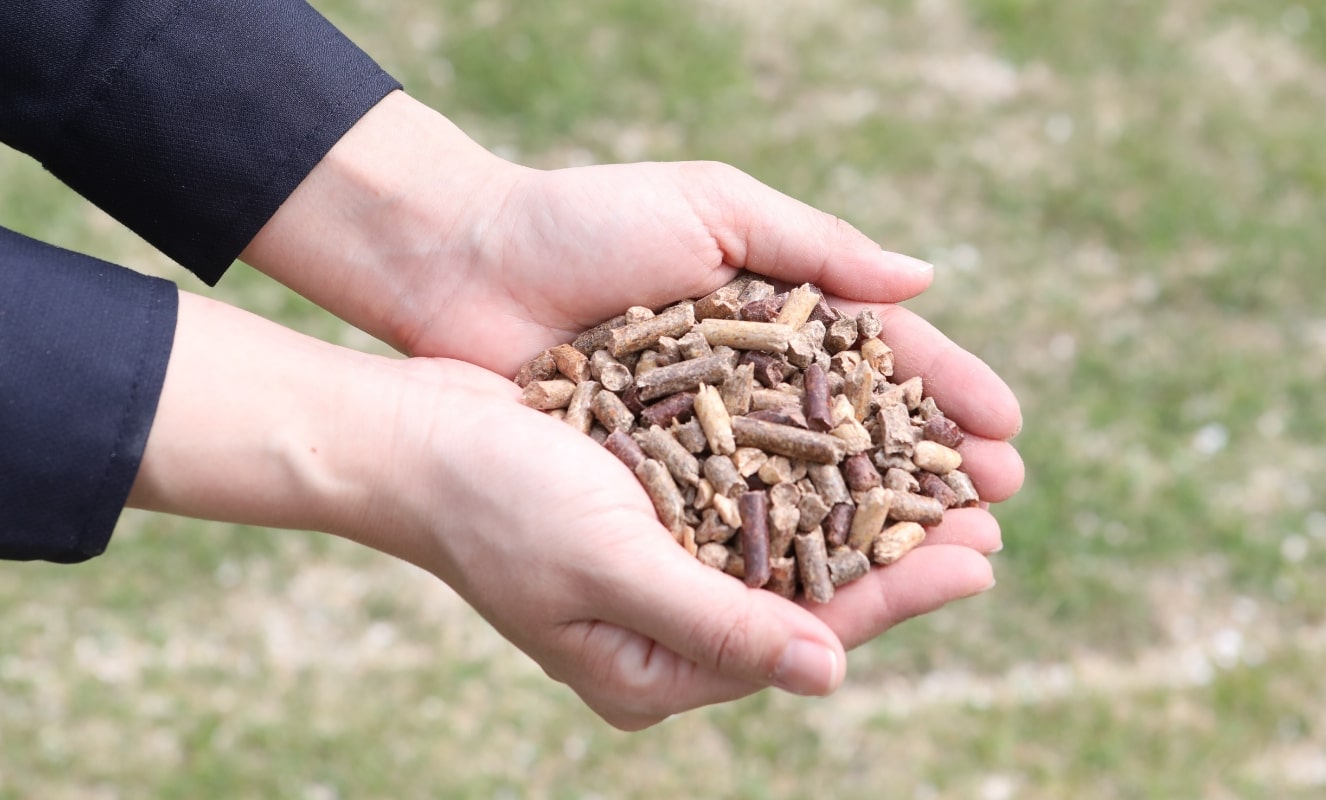
Wood pellets
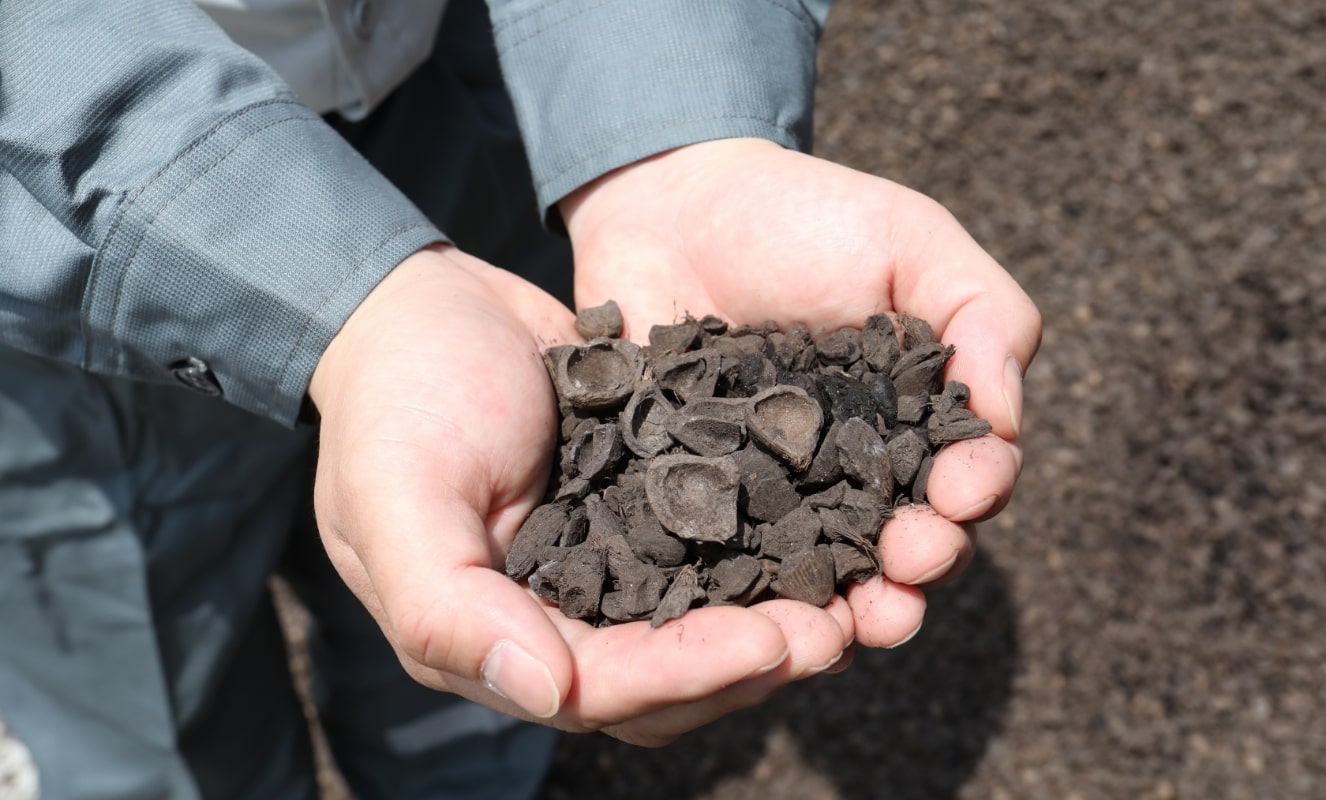
PKS (palm kernel shells)
-
Initiatives Aimed at Realizing a Recycling-Based Society
RENOVA contributes to the creation of a recycling-oriented society by reducing the amount of waste produced by biomass power generation as much as possible, and by appropriately disposing of waste and recycling it to the maximum possible extent.
The main waste output from biomass power generation is ash from the combustion of wood biomass fuels.
RENOVA recycles this ash into roadbed materials and cement, etc.
Akita Biomass Power Plant also uses construction waste as a heat source for dryers used to dry wood biomass fuels before combustion. -
Global and Regional Environmental Initiatives
RENOVA implements initiatives to minimize the impact of its business on water, air and the surrounding environment, and aims for business operations that have a low impact on the global environment and are acceptable to local residents.
With regard to water resources, in order to minimize the impact of hot water discharged by biomass power plants, we have implemented initiatives such as changing the cooling method of steam discharged from turbines to an air-cooled system (instead of a water-cooled system).
The Ishinomaki Hibarino Biomass Power Plant and the Omaezakikou Biomass Power Plant—which are currently under construction—were originally designed to utilize a seawater cooling system for cooling purposes by taking in neighboring seawater (around 300,000 tons of water is taken in and discharged at a sea temperature of +7°C per day). At the Sendai Gamo Biomass Power Plant, a water cooling system using industrial water was initially envisioned at the design stage.
In consideration of the concerns of fishermen in each region, however, we decided to change our original designs and switch to an air-cooled system.
We have also installed oil-water separation tanks at our biomass power plants to consistently ensure that no oil or other waste is leaked into the ocean during construction work.
For example, at Sendai Gamo Biomass Power Plant, Omaezakikou Biomass Power Plant, and Tokushima Tsuda Biomass Power Plant, biomass fuels such as PKS—which can be a cause of foul odors and dust—are not stored outdoors in the open air, but in fuel tanks and fuel storehouses.
As dust control measures, we are working to prevent dispersal to neighboring industrial parks and residences by installing dust barriers and nets and sprinkling water.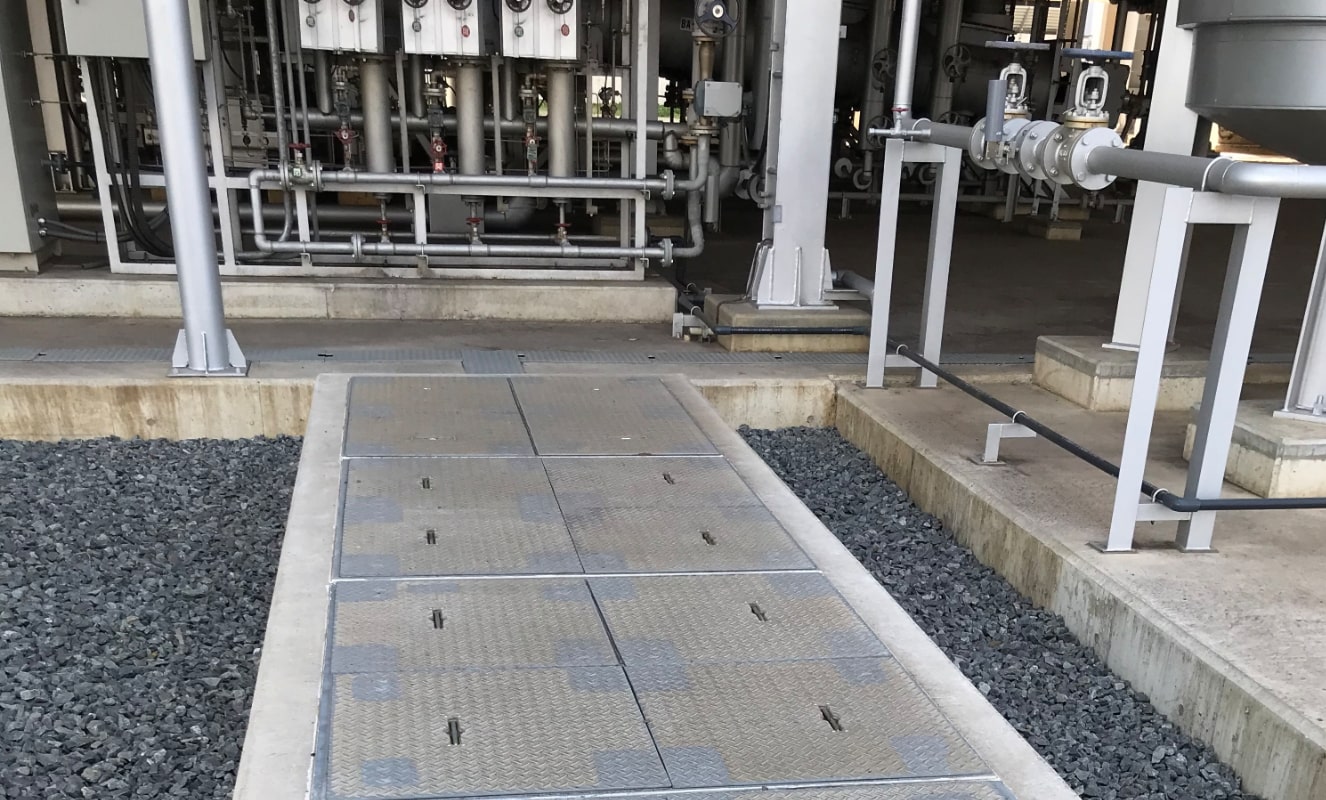
Oil-water separation tanks at Kanda biomass
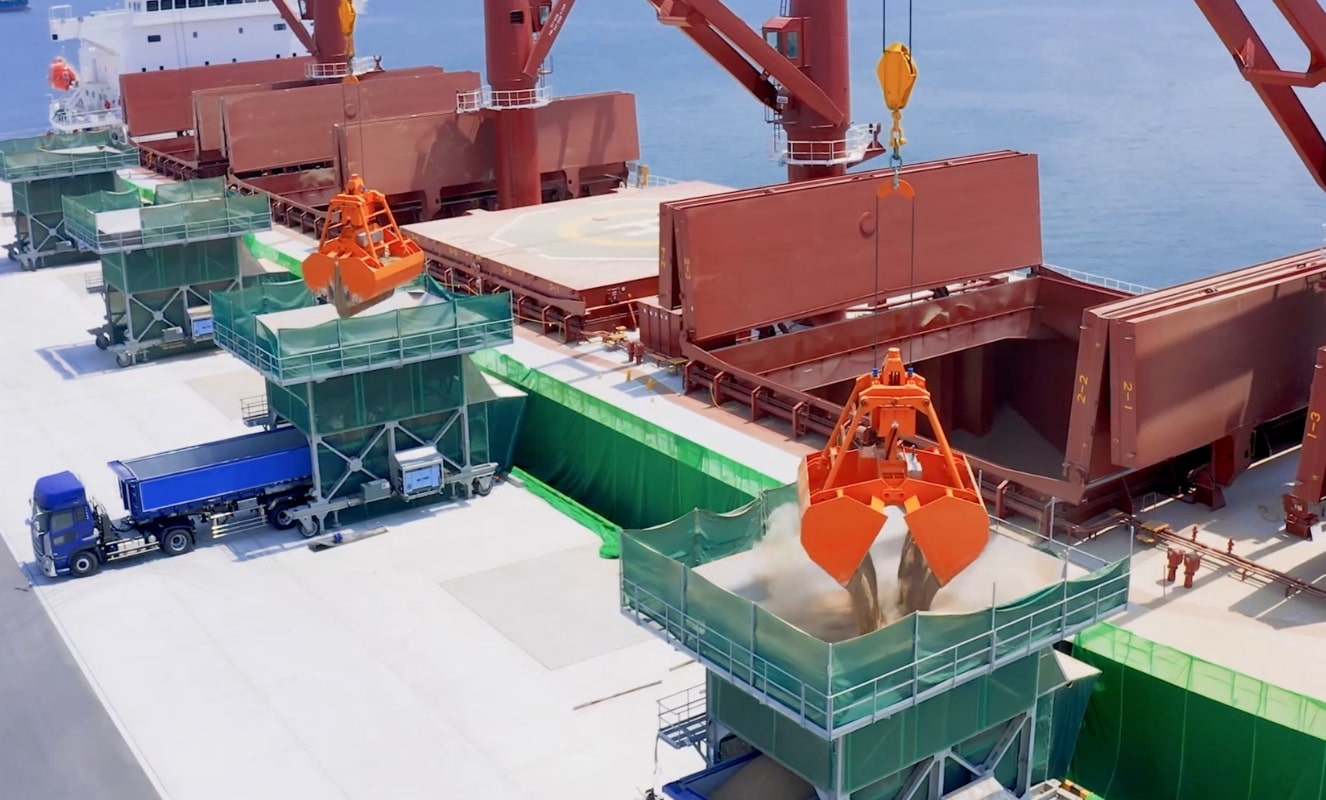
Dust scattering prevention sheet used when unloading fuel
-
Initiatives to Preserve Biodiversity
In order to reduce the impact of its business operations on biodiversity as much as possible, RENOVA strives to conserve biodiversity by ensuring the implementation of environmental impact assessments, actively engaging in dialogues with local communities and taking necessary measures.
In the case of the Sendai Gamo Biomass Power Plant, it was confirmed that there are rare animals and plants living in the nearby Gamo tidal flats.
We deepened our understanding of the ecology of plants and animals in the area through dialogues with local residents and by conducting environmental impact assessments, and considered measures to contribute to preserving biodiversity from the design stages.
As a result, we have created planting sites within the Sendai Gamo Biomass Power Plant site that utilize the vegetation of native and local species that inhabit the Gamo tidal flats while referring to the opinions of local university experts, etc.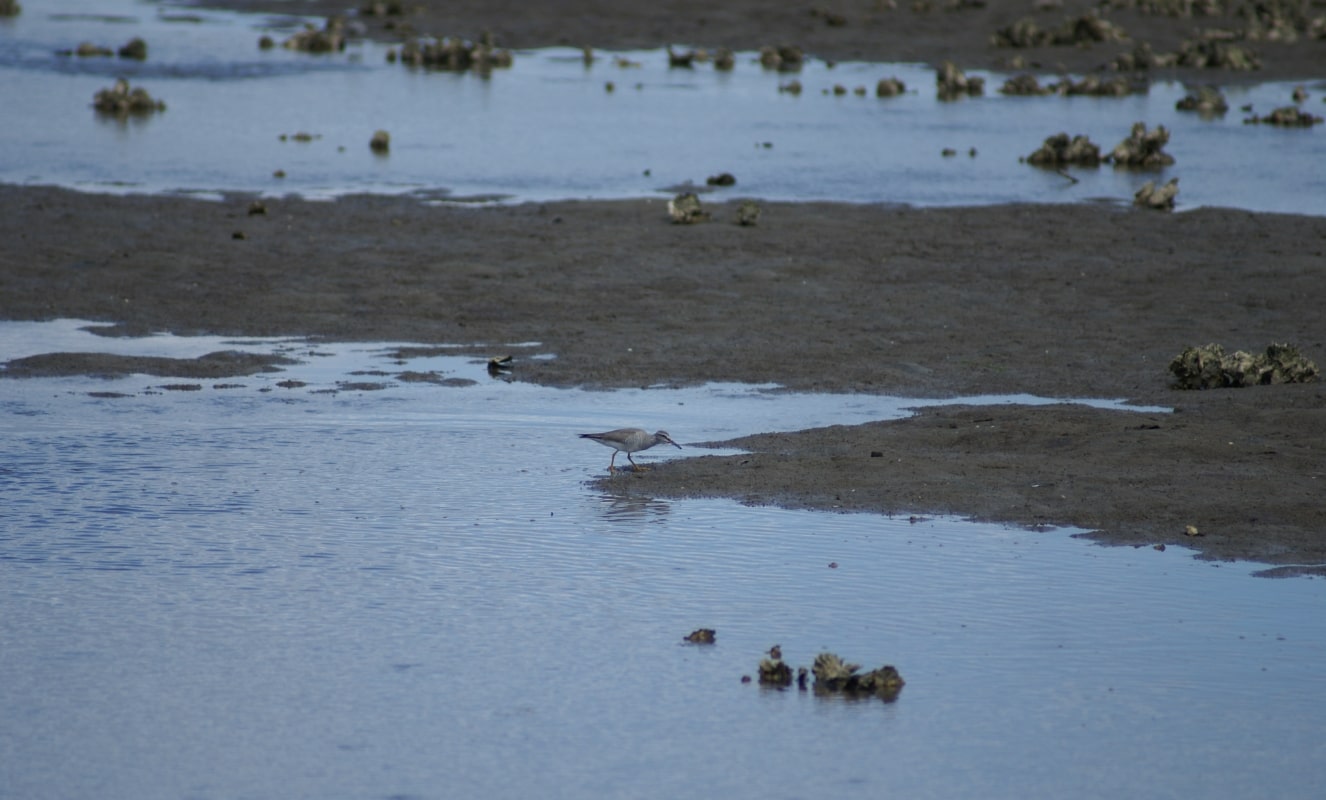
Gamo tidal flats living rare species
-
Sincere Communication with Local Communities
RENOVA has always placed an emphasis on squarely and sincerely addressing the concerns of local communities associated with the construction and operation of power plants, and engaging in open dialogue from the earliest stages of development.
At the development stage, in addition to statutory briefings based on environmental impact assessments, we held frequent voluntary briefings at each neighborhood association and local council unit to repeatedly explain aspects of the project and listen to points of concern.
For example, at the Ishinomaki Hibarino Biomass and Sendai Gamo Biomass power plants, in addition to our environmental impact assessment, we also conducted a fishing impact survey and changed the cooling method of our boilers in response to concerns about the impact of warm wastewater on the marine environment.
Even after commencing construction, we continue to communicate with local community residents.
For example, at the Tokushima Tsuda Biomass Power Plant, we are working to and create opportunities to deepen understanding of the plant by reporting on the progress of construction work and providing information on construction sites to members of the local community. -
Activities Contributing to History, Culture and Liveliness in Local Communities
RENOVA aims to build relationships of harmonious coexistence and prosperity with the local communities in the vicinity of its power plants and believes that it is important it respect local activities, history and culture.
For example, at the Akita Biomass Power Plant, approximately 70% of fuel is procured in Akita Prefecture.
As a result of this, it has become possible for forestry operators to sell timber remnants (for which sales channels had been limited until now) as fuel, and has generated investments such as in the construction of several new wood chip factories in the prefecture, leading to the revitalization of the local forestry industry.
We are also continuously creating employment opportunities, such as revitalizing ports through the unloading of imported PKS, which accounts for approximately 30% of the fuel we use.
In addition to contributing to environmental studies by wide acceptance of power plant tours for local residents, we have donated all proceeds from power plant tours to the Senshu Park Sakura Fund, which was established in 2009. (Approximately 1.9 million yen has been donated over the course of four years, since FY2016).
This fund was established with the aim of passing the cherry blossoms of Senshu Park (the ruins of Kubota Castle)—which has been designated as a scenic spot in Akita City—on to the next generation. Through this initiative, we are contributing to the passing on of local nature and culture to future generations.
The power plant also purchases Akita Cedar cookies manufactured at a support facility for people with disabilities—operated by the social welfare corporation Ichiyou-Kai—and distributes them as souvenirs to power plant visitors, contributing to the provision of continuous employment opportunities.Kanda Biomass Power Plant also procures a portion of its wood chips from northern Kyushu (the neighboring prefecture) and is contributing to revitalizing the local forestry industry.
Sendai Gamo Biomass Power Plant plans to sponsor and donate a portion of the profits from its operations to a project to release juvenile fish and shellfish in the area, as a contribution to maintaining and developing the local fishing industry.
We also plan to establish a Gamo Nakano Museum on the premises of the power plant educating visitors on the history of the area before and after the earthquake and renewable energy, and hold regular meetings with local community members regarding the contents of the exhibits.
Even since the construction of this power plant, the structure of the building has been changed from the original design in order to maintain the scenery overlooking the sea from the memorial monument standing on the site of a nearby elementary school damaged by the 2011 Tohoku earthquake and tsunami.
At the Tokushima Tsuda biomass Power plant, in response to requests from local residents, we are working to replace old desks, chairs, and other outdated equipment in community centers with more lightweight ones that are easier for senior residents to handle.
To contribute further to environmental and forestry-related learning in the future originating from the biomass power plant, we plan to build facilities using locally produced wood.
We are also planning to collaborate with local forestry and building materials businesses on the production of content for learning about the environment and forestry, and the cultivation of fast-growing trees as an initiative to increase the percentage of fuel produced domestically in Japan.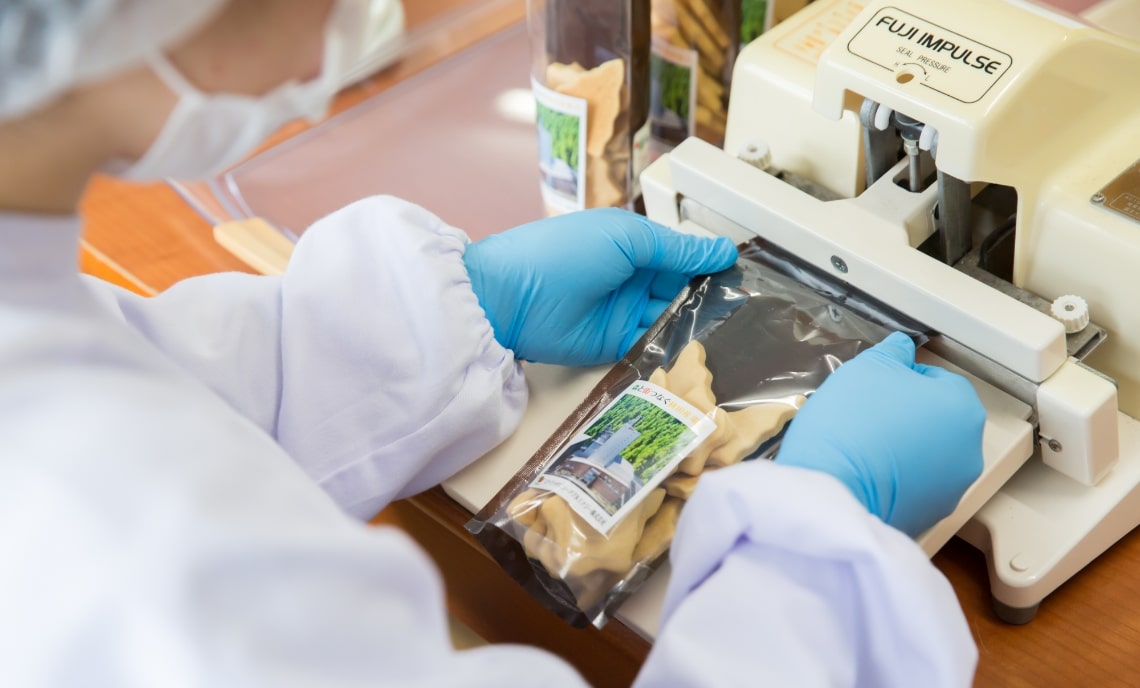
Cookies produced by a local welfare corporation are given to
Akita Biomass visitors.
